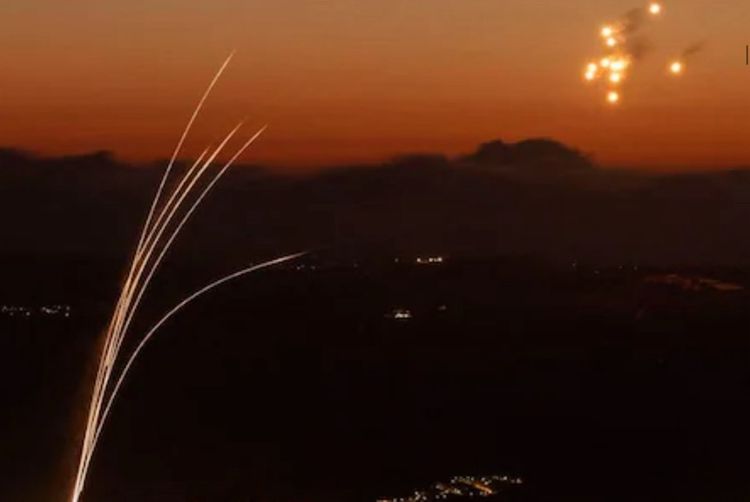Will The Israel-Hezbollah Conflict Turn Into A Full-blown Regional War? | Madras Courier

Lebanon must avoid another conflict at all costs. The citizens of Lebanon are against any form of warfare.
Israel initiated a number of air strikes in Lebanon as a preventive measure, claiming it was for self-defense. The IDF mentioned that Hezbollah, a militant group supported by Iran, was getting ready to launch a large-scale rocket and missile attack on central and northern Israel. Therefore, in order to eliminate these dangers, the IAF fighter jets targeted Hezbollah's locations that were seen as an immediate threat to the people of Israel.
As a response, Hezbollah fired over 320 Katyusha rockets at 11 military bases and barracks in Israel. While it was a significant attack, it did not aim for important buildings, a major city, or civilians. This shows that Hezbollah followed the rules of engagement during their retaliation. The attack was triggered by Israel's strike on Beirut, where a key commander, Faud Shukr, was targeted for assassination.
The Israeli military said it stopped most of the rockets fired by Hezbollah towards Israel. To be safe, Ben Gurion International Airport in Israel announced delays and diversions for flights on Sunday. Emergency services are on high alert, preparing for possible big attacks from Hezbollah.
Also, the Israeli authorities placed limitations on social gatherings and the mobility of its inhabitants; a maximum of 30 individuals are allowed to assemble in outdoor spaces, while up to 300 can gather in indoor structures. Additionally, recreational events in Tel Aviv and Haifa were called off, and beaches as well as cultural institutions were shut down.
"Anyone who attacks us will face consequences," stated Israel's Prime Minister, Benjamin Netanyahu, emphasizing his commitment to assisting the thousands of displaced residents in the northern region.
Lebanon's official news agency released information about Israeli bombings in southern Lebanon, specifically in Tayr Harfa, Deir Seryan, and Beit Yahoun. The assault, according to the article in the New York Times, was noted as the most intense since the beginning of the conflict in Gaza.
Starting on October 8, 2023, Hezbollah and the Israeli army have been fighting each other every day along the Blue Line border. The conflict has led to many people being injured or killed, with most of the casualties occurring in Lebanon. The killing of a top Hezbollah leader, Fouad Shukr, by Israel in July raised concerns that a larger war could break out.
These recent events have sparked worries about an increase in fighting between Hezbollah and Israel. Additionally, Hamas claims it launched a missile towards Tel Aviv, though the IDF reports it landed in the outskirts. Despite ongoing negotiations for a truce and the release of hostages in Gaza, the situation at the border remains tense.
In light of the increased tensions in the area, the United States confirmed its commitment to backing Israel's right to protect itself. Sean Savett, a spokesperson for the United States National Security Council, stated that, under President Joe Biden's guidance, top US officials have been in constant communication with Israeli leaders. The US intends to continue supporting Israel's right to self-defense and strive for stability in the region.
The US Defense Secretary, Lloyd Austin, announced that he had a conversation with the Israeli Defense Minister, Yoav Gallant, about Israel's protection from potential attacks by Hezbollah. In a statement on X platform, he stated, "I reassured Israel of the strong support from the United States in defending against any threats posed by Iran and its allies in the region."
In the same way, the Defense Secretary of the UK, John Healey, emphasized the UK's backing of Israel's safety and the significance of reaching an agreement on stopping the fighting in Gaza. He mentioned, "we talked about our mutual worry of preventing things from getting worse and causing a larger conflict in the region."
After Israel bombed Lebanon, Najib Mikati, the acting Prime Minister, convened an urgent meeting with his team of ministers at his residence in Beirut to address the crisis.
The violent conflict between Israel and Lebanon in 2006 left lasting memories; a lot of infrastructure in Lebanon was damaged, and over 1,000 people lost their lives. Since then, Lebanon has faced numerous challenges, such as a worsening economy, political gridlock, and the devastating explosion at Beirut's port four years ago.
Lebanon is unable to handle another conflict. The citizens of Lebanon are against another war. Yet, "when you talk to individuals here, they emphasize that they will not have a say in the decision. They realize that it will not be the Lebanese government or military that determines if there will be a war. It will be Hezbollah, supported by Iran, and Israel. There is a sense of acceptance to some extent, but also worry."
Copyright ©Madras Courier, all rights reserved. Feel free to use our article tools to share. Please refrain from copying articles from madrascourier.com and sharing via email, posting on the internet, mobile phones or social media. We welcome your feedback and comments, so please send them to [email protected].







































